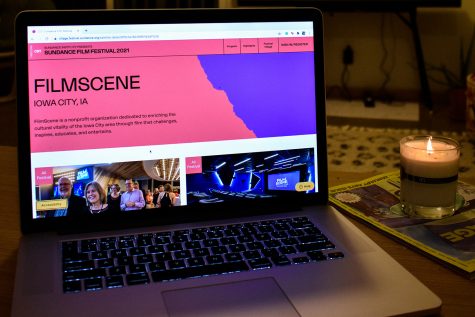‘the serpent under’t’ sheds new light on theatrical trauma stories
Kicking off its spring season, the University of Iowa Theatre Department will virtually release ‘the serpent under’t, a play that puts a new twist on the Greek myth of Medusa.
The University of Iowa Theater Building is seen on Monday, May 6, 2019.
February 4, 2021
This article includes mentions of sexual misconduct and trauma
When University of Iowa student Emmy Lane Palmersheim was young, they adored the stories of Greek mythology. They read all of the Percy Jackson books, studied Greek mythology, and became particularly fascinated by the story of Medusa.
For their third show put onstage at the UI, the student playwright wrote a retelling of the classic Medusa myth — from Medusa’s perspective, and from that of her siblings, Stentho and Euryale.
“I’ve always thought that Athena punishing Medusa was interesting,” Palmersheim said. “I knew I wanted to see a version where it was like a powerful weapon… the entire event and the received feedback.”
‘the serpent under’t’ is the first gallery production of the Spring 2021 season. The play will premiere on the UI Theatre Arts YouTube channel on Feb 6. The show, as stated on the UI Theatre website, uses a modern, feminist, queer critique to examine the ramifications of trauma and the nature of being a woman in ancient Greece, as well as the 21st century.
“The overall message I hope to send is that no matter what trauma you go through, there is always someone there for you to love you,” Palmersheim said.
UI theatre arts major Albert Williams said they were challenged by directing the production solely over Zoom. Because of the COVID-19 pandemic, the cast couldn’t gather together and perform the show live on a stage. Rehearsals over Zoom started in late November, with the cast and crew rehearsing for three hours a night during the week.
“Having the experience of working with Erica Barnes on a production last semester served as the biggest inspiration for how I went about directing this production,” Williams said. “Knowing how to ‘spice up a Zoom meeting’ helped me realize what I could develop within this show.”
With only five members, the cast is relatively small meaning some actors were double-casted for roles. First-year theatre arts major Kelli Tosic plays Keto and Athena. This will be her second production at the university.
RELATED: Essential Workers: A Portrait honors those who are needed most by combining theatre and art
“Playing two different roles within the same production had its challenges at first, especially because the characters are polar opposites,” Tosic said. “But each one has evolved so much in the process and I can’t wait to see the end result.”
Understanding the dialogue and meaning behind the show was incredibly important to both Palmersheim and Williams. The cast engaged in many discussions about the show’s themes, as they revolve around mature topics.
“Our entire process has been very collaborative, and I have loved diving in deeper to our show material,” Tosic said. “Most shows, you don’t get to have as much time to discuss dialogue and meanings, it has been super special for all of us.”
Since the production is entirely online, the cast and crew derived new, exciting ways to replicate technical elements that would have been added had they been in-person. For lighting, the cast members utilized LED lights, designating certain colors to certain moods correlating with the dialogue. They also used clothing pieces from their own wardrobes for the modern twist on traditional Greek mythology costuming.
“The cast has been incredible to work with. While we wish we were sharing the same physical space, it has still been a great experience to grow with these artists,” Williams said.
Palmersheim is a member of the Student Advisory Committee on Sexual Misconduct. The play contains strong themes regarding sexual misconduct, and they encouraged viewers to reach out to the Rape Victim Advocacy Program website if they need resources and help.
“Trauma stories can be told without entirely traumatizing the cast working on the production, as well as the audience members entering the story world,” Palmersheim said.
















